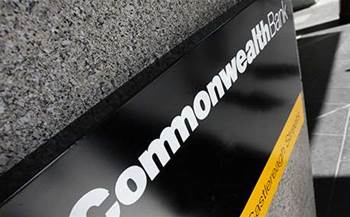The former head of IT delivery services for the Commonwealth Bank has been sentenced to three-and-a-half years in jail for accepting kickbacks from an IT vendor to award it a lucrative contract with the bank.
Keith Hunter was today found guilty of dishonestly causing financial disadvantage by deception, and being an agent corruptly receiving benefit.
The first carries a maximum penalty of 10 years in jail, and the second a maximum penalty of seven years.
Justice David Arnott today said Keith Hunter's crimes fell right into the middle of the range of seriousness for offences of this type.
This factor, along with deterrence, his good character, mental health, guilty plea, and lack of previous convictions, were considered in the sentencing.
Hunter was given a non parole period of two years and three months, starting from yesterday.
Kickbacks
Hunter and former colleague Jon Waldron were charged in March last year.
Police alleged the pair had accepted financial kickbacks throughout 2013 and 2014 from the former head of ServiceMesh, Eric Pulier, in exchange for awarding the company a $10.5 million deal with CBA.
Hunter's payments specifically totalled US$630,000. The court today heard that Hunter had been hoping for at least US$1 million.
ServiceMesh sold CBA McAfee software that the bank had rejected a year earlier for being too expensive, at a $3.3 million mark-up, as well as Pivotal software that was never used.
The contract was not taken out to tender, and Hunter split up transaction documents into seven separate files for individual approval in order to bypass proper procurement processes and get the deal through.
The scheme was perpetrated to propel ServiceMesh to reach performance targets that triggered a US$98 million (A$122 million) payout to ServiceMesh shareholders following its acquisition by CSC in 2013.
Hunter and Waldron both originally pleaded not guilty, but on June 9 this year Hunter changed his plea to guilty. Waldron has maintained his not guilty plea, and his case remains ongoing.
Hunter’s lawyers had argued for a reduced sentence claiming the behaviour was a “massive aberration” to Hunter’s character, as well as his alleged belief that CBA would also benefit from his actions.
They had asked the judge to consider his mental condition - evidence was tendered that he suffers from a severe depressive order - as well as the fact that he would be entering jail for the first time at age 62, was unlikely to reoffend, and had spent the past 18 months on bail.
State prosecutors rebuffed Hunter’s argument that he had been a follower rather than a leader in the scheme, pointing to his high-level role and salary - $1 million base per year - at the bank.
“He held a very highly-paid, trusted, executive position that came with a lot of responsibilities. He was someone who could make a lot of decisions and was trusted to do so,” the state prosecutors argued.
“He may have had advice from [ServiceMesh founder Eric] Pulier and Mr Waldron, but at the end of the day, he signed off on it.”
CSC has made a US$630,000 application for loss and compensation directly to Hunter as a result of his actions.
Hunter has forfeited his proceeds from the scheme to the Crime Commission and US authorities.
Justice Arnott today adjourned the compensation matter until March next year to allow CSC and Hunter to provide evidence.
Whistleblower could have delayed deal: Hunter
Former CBA employee Marcus Nicholson tried to alert the bank to his concerns about the contract, but claimed he was victimised by superiors and then sacked two months later after refusing to greenlight the deal.
The bank has claimed that the decision not to award Nicholson a position after a fill and spill of his division was to do with internal conflicts, and was unrelated to the scandal. Nicholson was the only employee not to be re-awarded his job in the restructure.
In court today, Hunter admitted that Nicholson's sacking worked out well for him and Waldron.
He conceded that Nicholson’s criticisms were slowing down the process of awarding the deal, threatening it from closing during ServiceMesh's important earnout period and potentially impacting the payments made to Hunter for awarding it.
Hunter also admitted to the court that he had been unable to provide an answer when Nicholson questioned the value ServiceMesh was adding to the McAfee product it was supplying to the bank.
Judge Arnott said he accepted that the sacking wasn’t a direct attempt to silence Nicholson, but noted that it did result in a “happy coincidence” for Hunter and Waldron.
Ongoing lawsuits in the US
Hunter has also been charged in his home country of the United States with two counts of fraud, which - if found guilty - would see him face a maximum 45 years in prison.
The US SEC has additionally filed civil charges against Hunter for securities fraud. The former IT executive has agreed to settle the civil charges.
CSC is separately suing ServiceMesh founder Eric Pulier - who resigned from the company last year just days before he was due to be let go - to return the US$98 million. Pulier has counter-sued.
CBA itself was sued by Ace Foundation - the US-based not-for-profit Judge Arnott found was used to faciliate the payments to the executives, and which has since rebranded to CoreTech Foundation - last year for "wrongfully" freezing the payments made to Hunter and Waldron.
The parties reached an out-of-court settlement in March.


























